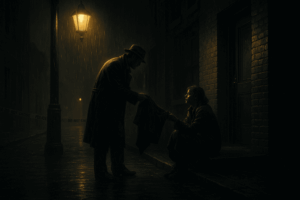
Noir fiction holds a special place in the world of crime literature. It’s a subgenre that goes beyond solving mysteries and dives deep into the raw, unfiltered reality of human flaws. These stories don’t shy away from the dispossessed, the morally dubious, or the emotionally broken. Instead, they amplify voices often ignored in polite society, offering a lens into the harshest corners of life.
Noir stands apart because it’s rooted in reality, lacking the fantastical elements of other genres. This connection to the real world makes it transgressive, honest, and ultimately timeless.
Noir’s Resilience and Evolution
For years, noir fiction faced criticism from readers and industry insiders. Yet, it has endured and even flourished thanks to digital publishing. With a broader audience now accessible, noir has emerged stronger, ready to connect with new generations. While it may never reach the mainstream appeal of more conventional crime stories, that’s part of its allure. Noir thrives as the outsider, the rebellious voice in a world of conformity.
Misconceptions About Noir
To truly appreciate noir, it’s essential to clear up a few common misconceptions:
- Not Just for the Working Class: While early pulp audiences were often working-class readers, noir’s characters range from struggling laborers to affluent schemers. The stories resonate across all social strata.
- Not About a Broken World: Noir doesn’t depict a universally dark world. Instead, it contrasts flawed protagonists against ordinary settings. The turmoil comes from within the characters themselves, not the environment around them.
- Not Purely External Conflict: In the best noir, the struggle is internal. Characters battle their desires, guilt, and identity, driving the plot forward in deeply personal ways.
- Not Defined by Tropes: Forget the fedoras, femme fatales, and foggy alleys. While these might be staples of film noir, noir fiction is modernist and grounded in contemporary realities, making it as relevant today as ever.
The Defining Element: Compassion
Eddie Muller once said, “Noir does not call for ironic detachment. It calls for the ultimate commitment: a willingness to go to the darkest places and remain compassionate in the face of hopelessness.” This idea encapsulates the soul of noir
The greatest noir writers – Cain, Thompson, Goodis, and Willeford – cared deeply for their characters, even the morally ambiguous ones. They brought empathy to every corner of their stories, ensuring readers could connect with even the most flawed protagonists. Without compassion, noir risks becoming a shallow catalog of unfortunate events
Why Noir Matters Today
Noir fiction reminds us that even in life’s darkest moments, there’s humanity to be found. It challenges readers to confront uncomfortable truths and connect with perspectives they might otherwise avoid. This enduring relevance is why noir continues to thrive, offering a mirror to society’s edges and those who inhabit them
So, if you’re looking to write noir or simply explore it as a reader, remember this: compassion is the cornerstone. It’s the thread that binds the genre’s best works, turning tales of despair into stories that resonate deeply